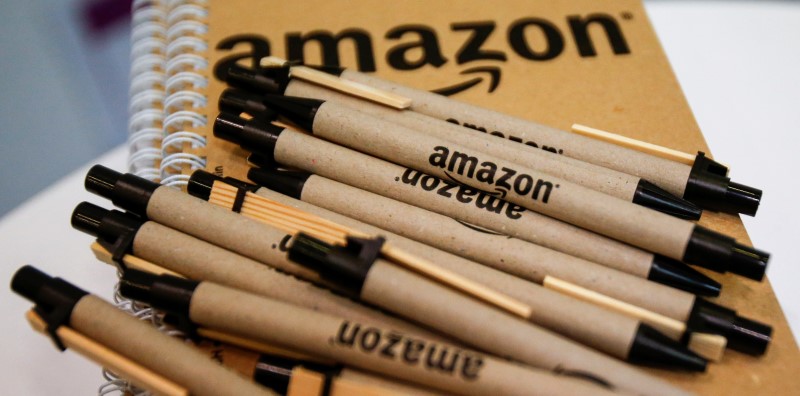Douglas J. Herrington, the CEO of Worldwide Amazon (NASDAQ:AMZN) Stores, has sold a portion of his Amazon (NASDAQ:AMZN) stock, according to a recent filing with the Securities and Exchange Commission. The transactions, which took place on August 21, 2024, involved the sale of a total of 6,104 shares at prices ranging from $180.5731 to $182.1754, amounting to over $1.1 million.
The filing details multiple transactions where Herrington disposed of Amazon shares. The highest reported sale price was $182.31, with the lowest being $179.97. These sales were executed under a pre-arranged trading plan, known as a Rule 10b5-1 trading plan, which was adopted by Herrington on November 6, 2023. Such plans allow insiders to sell shares at predetermined times and prices to avoid accusations of trading on non-public information.
In addition to the sales, Herrington also acquired shares through the exercise of options, which did not involve any immediate cash transaction. These transactions are part of a standard compensation structure for executives and are separate from the open-market sales.
Investors often monitor insider transactions as they can provide insights into an executive’s view of the company’s current valuation and future prospects. Herrington's transaction follows the typical pattern of executives periodically selling shares for personal financial management, including diversification and liquidity.
Following these transactions, Herrington's direct ownership in Amazon stock has seen changes, but he remains a significant shareholder of the company. Amazon has not released any official statement regarding these transactions, and they remain a routine part of executive compensation and stock ownership for high-level executives within the company.
As always, investors are advised to consider the broader market and company context when evaluating insider transactions. Amazon continues to be a dominant player in the retail and cloud services sectors, with stock performance being influenced by a wide array of factors beyond individual insider trades.
In other recent news, Disney and Reliance's proposed $8.5 billion merger is facing regulatory hurdles over concerns of potential monopoly on cricket broadcast rights. To address these concerns, the companies may have to sell some of their cricket broadcast rights or implement advertisement price caps for cricket matches.
Amazon has been accused by India's commerce minister, Piyush Goyal, of engaging in predatory pricing tactics. Goyal questioned Amazon's investment strategies, suggesting the company uses its funds to offset business losses rather than to enhance services.
In cooperation with Glowmade, Amazon Games announced the launch of "King of Meat," a new online cooperative action game. The game allows up to four players to engage in combat within the fantastical realm of Loregok.
Morgan Stanley (NYSE:MS) reaffirmed its positive stance on shares of Amazon, maintaining an Overweight rating and a $210.00 price target. The firm's analysis highlighted strategies for Amazon to enhance profitability, including reducing service costs, increasing basket sizes through scale, and leveraging advertising.
Lastly, Standard & Poor's revised its outlook on Warner Bros Discovery (NASDAQ:WBD) to "negative" from "stable", reflecting concerns over the ongoing decline in the company's cable TV business. The company's gross debt stands at $41.4 billion as of June 30. These are recent developments that investors should take into account.
InvestingPro Insights
As investors assess the implications of Douglas J. Herrington's stock sale, it's worth considering the broader financial context of Amazon (NASDAQ:AMZN) through the lens of InvestingPro insights. With a market capitalization of $1.86 trillion, Amazon stands as a giant in the Broadline Retail industry, a status that is reflected in its substantial revenue of $604.33 billion over the last twelve months as of Q2 2024. This revenue growth is notable, with a 12.32% increase year-over-year, underscoring the company's robust performance and market expansion.
An InvestingPro Tip points out that Amazon is trading at a low Price/Earnings (P/E) ratio relative to near-term earnings growth, with the current P/E ratio sitting at 41.38. This could suggest that the stock is undervalued given its earnings trajectory. On the flip side, the company is also trading at a high earnings multiple, which could indicate a premium on its growth expectations.
In terms of financial health, Amazon's cash flows are strong enough to comfortably cover interest payments, and the company operates with a moderate level of debt. This financial stability is crucial for investors, especially in times of market volatility. Moreover, analysts predict the company will be profitable this year, continuing a trend as the company has been profitable over the last twelve months.
For those looking for more comprehensive insights, there are additional InvestingPro Tips available at https://www.investing.com/pro/AMZN, which could further inform investment decisions regarding Amazon's stock.
This article was generated with the support of AI and reviewed by an editor. For more information see our T&C.
